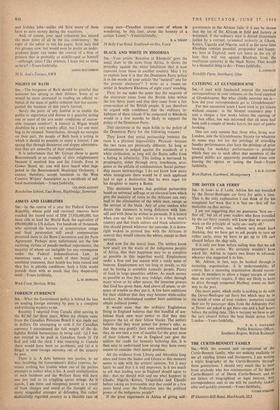BLACK AND WHITE IN RHODESIA SIR,—Your article 'Reaction in Rhodesia'
gave the usual slant to the news from Africa. It shows the prejudice against the white inhabitant that is now expected from those in another country. May I try to explain how it is that the Dominion Party policy is in the words of your article 'the "natural" one for the present electorate'? I write as a recent ex- settler in Southern Rhodesia of eight years' standing.
First, let me make the point that the majority of the electorate came from the British Isles within the last thirty years and that they came from a fair cross-section of the British people. It can therefore be argued with confidence that the ordinary in- habitant of these islands if he emigrated to Rhodesia would in a few months be likely to support the policy of the Dominion Party.
This electorate in the main holds to the policy of the Dominion Party for the following reasons: They know that social partnership between the races is a physical impossibility. Physical—because the two races are physically different. So long as advancement is judged against the standards of a white civilisation, so long will the Bantu suffer from a feeling in inferiority. This feeling is increased by propinquity, either through envy, touchiness, arro- gance or the pitfalls of condescension. Social partner- ship means intermarriage. I do not know how many white immigrants there would be if each applicant had to sign a declaration that he were eager fOr his daughter to marry a Bantu.
This electorate knows that political partnership based on universal suffrage or on electoral laws which give the majority of votes to the Africans can only lead to the elimination of the white man, except as the servant of the black. Any of your readers who denies this statement is being dishonest with him- self and with those he wishes to persuade. It is honest when you say that you believe it is a black man's country and that black culture and black administra- tion should prevail whatever the outcome. It is down- right wicked to pretend that with- the Africans in control they would tolerate the whites, except as their servants.
And now for the moral issue. The settlers know how small are the wants of the indigenous peoples of Africa, that their happiness may be as complete as possible in this imperfect world. Employment under a firm and just master with a ready sense of humour. Employment not too long or steady, as this can be boring to erstwhile nomadic people. Plenty of food in large quantities seldom. As much money as possible so that they may indulge, either through many wives or by other means, the immense powers that God has given them. And above all peace, or ab- sence of trouble as they put it. A few have ambitions for their children that they may become white-collar workers. An infinitesimal number have ambitions to obtain political power.
It would seem that the ordinary Englishman living in 'England believes that this handful of am- bitious black men want power so that they may improve the lot of their fellow blacks. The settlers believe that they want power for power's sake, so that they may gratify their own ambitions and that they do not care a row of mealies for the great mass of their fellows. If we in England can give the settlers the credit for honestly believing this, it is then easy to understand how strong they have every reason to consider their moral position.
All the evidence from Liberia and Abyssinia long since and from the Sudan and Ghana at this moment seems to side with the settlers' opinion. Yet it may fairly be said that it is still unproven. Is it too much to ask that leading men in England should agree to this: that we should wait and see what happens in Ghana; Nigeria, Kenya, Tanganyika and Uganda before taking an irrevocable step that could in a few years hand over the Federation into the political power of the indigenous people?
If the great experiment in Africa of giving self- government to the African fails; if it can be shown that the lot of the African in field and factory is worsened; if the ordinary man is denied elementary justice by a corrupt, tyrannical minority in Ghana, Kenya, Uganda and Nigeria, and if at the same time Rhodesia remains peaceful, progressive and happy; we, here in England, must not listen to the cry of hate that will rise against Rhodesia from the vociferous minority in the black States. That would be a shameful thing to do.—Yours faithfully,


































 Previous page
Previous page